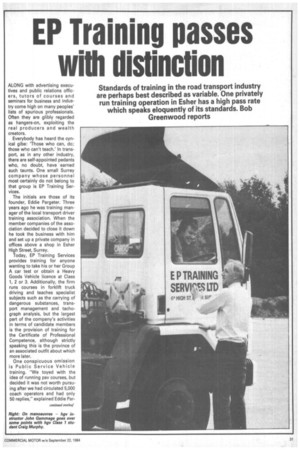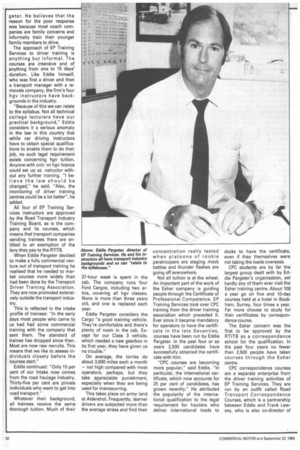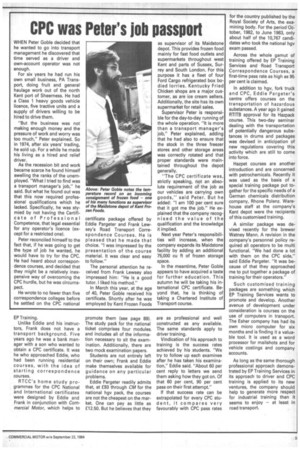EP Training passes with distinction
Page 33

Page 34

Page 35

If you've noticed an error in this article please click here to report it so we can fix it.
ALONG with advertising executives and public relations officers, tutors of courses and seminars for business and industry come high on many peoples' lists of spurious professionals. Often they are glibly regarded as hangers-on, exploiting the real producers and wealth creators.
Everybody has heard the cynical gibe: 'Those who can, do; those who can't teach.' In transport, as in any other industry, there are self-appointed pedants who, no doubt, have earned such taunts. One small Surrey company whose personnel most certainly do not belong to that group is EP Training Services.
The initials are those of its founder, Eddie Pargeter. Three years ago he was training man ager of the local transport driver training association. When the member companies of the asso ciation decided to close it down he took the business with him and set up a private company in offices above a shop in Esher High Street, Surrey.
Today, EP Training Services provides training for anyone wanting to take his or her Group A car test or obtain a Heavy Goods Vehicle licence at Class 1, 2 or 3. Additionally, the firm runs courses in forklift truck driving and teaches specialist subjects such as the carrying of
dangerous substances, transport management and tacho
graph analysis, but the largest part of the company's activities in terms of candidate members is the provision of training for the Certificate of Professional Competence, although strictly speaking this is the province of an associated outfit about which more later.
One conspicuous omission is Public Service Vehicle training. "We toyed with the idea of running psv courses, but decided it was not worth pursu ing after we had circulated 5,000 coach operators and had only 50 replies," explained Eddie Par
continued overleaf
geter. He believes that the reason for the poor response was because most coach companies are family concerns and informally train their younger family members to drive.
The approach of EP Training Services to driver training is anything but informal. The courses are intensive and of anything from one to 15 days' duration. Like Eddie himself, who was first a driver and then a transport manager with a removals company, the firm's four hgv instructors have backgrounds in the industry.
"Because of this we can relate to the syllabus. Not all technical college lecturers have our practical background," Eddie considers it a serious anomaly in the law in this country that while car driving instructors have to obtain special qualifications to enable them to do their job, no such legal requirement exists concerning hgv tuition. Anyone with only an hgv licence could set up as nstructor without any further training. "I believe the law should be changed," he said. "Also, the monitoring of driver training centres could be a lot better", he added.
All four of EP Training Services instructors are approved by the Road Transport Industry Training Board, as is the company and its courses, which means that transport companies sending trainees there are entitled to an exemption of the levy they pay to the RTITB.
When Eddie Pargeter decided to make a fully commercial venture out of transport training he realised that he needed to market courses more widely than had been done by the Transport Driver Training Association. They are now promoted extensively outside the transport industry.
This is reflected in the intake profile of trainees: "In the early days most people who came to us had had some commercial training with the company that sent them. The standard of trainee has dropped since then. Most are now raw recruits. This means that we like to assess individuals closely before the courses start."
Eddie continued: "Only 15 per cent of our intake now comes from the road haulage industry. Thirty-five per cent are private individuals who want to get into road transport."
Whatever their background, all trainees receive the same thorough tuition. Much of their 37-hour week is spent in the cab. The company runs four Ford Cargos, including two artics, covering all hgv classes. None is more than three years old, and one is replaced each year.
Eddie Pargeter considers the Cargo "a good training vehicle. They're comfortable and there's plenty of room in the cab. Except for our Class 3 vehicle, which needed a new gearbox in its first year, they have given us no trouble."
On average, the lorries do about 3,000 miles each a month — not high compared with most operators, perhaps, but they take appreciable punishment, especially when they are being used for manoeuvring.
This takes place on army land at Aldershot. Frequently, learner drivers are subjected more than the average stress and find their concentration really tested when platoons of rookie paratroopers are staging mock battles and thunder flashes are going off everywhere.
Not all tuition is at the wheel. An important part of the work of the Esher company is guiding people through the Certificate of Professional Competence. EP Training Services took over CPC training from the driver training association which preceded it. Ever since it became mandatory for operators to have the certificate in the late Seventies, courses have been run by Eddie Pargeter. In the past four or so years 2,500 candidates have successfully obtained the certificate with him.
"CPC courses are becoming more popular," said Eddie. "In particular, the international certificate, which now accounts for 25 per cent of candidates, has grown recently." He attributed the popularity of the international qualification to the legal requirement for hauliers who deliver international loads to docks to have the certificate, even if they themselves were not taking the loads overseas.
CPC students are by far the largest group dealt with by Eddie Pargeter's organisation, yet hardly any of them ever visit the Esher training centre. About 100 a year go on five and 10-day courses held at a hotel in Bookham, Surrey, four times a year. Far more choose to study for their certificates by correspondence course.
The Esher concern was the first to be approved by the RTITB as a correspondence school for the qualification. In the past four years no fewer than 2,500 people have taken courses through the Esher centre.
CPC correspondence courses are a separate enterprise from the driver training activities of EP Training Services. They are run by an outfit called Road Transport Correspondence Courses, which is a partnership between Eddie and Frank Lewsey, who is also co-director of EP Training.
Unlike Eddie and his instructors, Frank does not have a transport background. Five years ago he was a bank manager with a son who wanted to obtain a CPC certificate. It was he who approached Eddie, who had been running residential courses, with the idea of starting correspondence courses.
RTCC's home study programmes for the CPC National and International certificates were designed by Eddie and Frank in conjunction with Commercial Motor, which helps to
promote them (see page 89). The study pack for the national ticket comprises four modules, and includes all of the information necessary to sit the examination. Additionally, there are two mock examination papers.
Students are not entirely left on their own; Frank and Eddie make themselves available for guidance on any particular problems.
Eddie Pargeter readily admits that, at £93 through CM for the national hgv pack, the courses are not the cheapest on the market. One can pay as little as £12.50. But he believes that they are as professional and well constructed as any available. The same standards apply to driver training.
Vindication of his approach to training is the success rates achieved by his students. "We try to follow up each examinee after he has taken his examination," Eddie said. "About 60 per cent reply to letters we send them asking how they got on. Of that 60 per cent, 90 per cent pass on their first attempt."
If that success rate can be extrapolated for every CPC stud e nt, it compares very favourably with CPC pass rates for the country published by the Royal Society of Arts, the examining body. For the period October, 1982, to June 1983, only about half of the 10,767 candidates who took the national hgv exam passed.
Across the whole gamut of training offered by EP Training Services and Road Transport Correspondence Courses, a first-time pass rate as high as 95 per cent is claimed.
In addition to hgv, fork truck and CPC, Eddie Pargeter's centre offers courses on the transportation of hazardous substances. A year ago it gained RTITB approval for its Hazpack course. This two-day seminar dealing with the transportation of potentially dangerous substances in drums and packages was devised in anticipation of new regulations covering this activity which are still to come into force.
Hazpet courses are another introduction and are concerned with petrochemicals. Recently it was used as the basis of a special training package put together for the specific needs of a German chemicals distribution company, Rhone Polenz. Warehouse staff at the company's Kent depot were the recipients of this customised training.
A similar package was devised recently for the brewer Watney Mann. A revision in the company's personnel policy required all operators to be multi functional. "We had done a lot with them on the CPC side," said Eddie Pargeter. "It was because of that they approached me to put together a package of training for their operators."
Such customised training packages are something which EP Training Services wants to promote and develop. Another avenue of development under consideration is courses on the use of computers in transport. The Esher company has had its own micro computer for six months and is finding it a valuable tool. It is used as a word processor for mailshots and for vehicle costings and company accounts.
As long as the same thorough professional approach demonstrated by EP Training Services in its approach to driver and CPC training is applied to its new ventures, the company should help to generate more respect for industrial training than it seems to enjoy — at least in road transport.




























































































